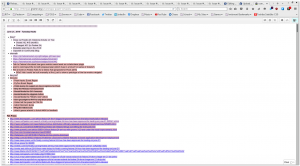Hack sessions are an informal style of meeting that originated within the CommOps team. Hack sessions are collaborative, audio/video calls between members of the CommOps team. In hack sessions, members work on various tickets or issues that are happening in the team. They're a great way to keep on top of ongoing work and get questions answered quickly by other members of the team. It's also a great way to get to know the team a little more.
How do they work?
Hack sessions are normally arranged by the Fedora Community Action and Impact Coordinator or other CommOps members. They normally have a rough agenda prepared ahead of time. Sometimes it can be tickets from that week's meeting, or other times, it might be major tasks or issues that were mentioned or discussed on the mailing list or IRC. CommOps usually prepares the agenda in this Etherpad. Throughout the session, we'll work through these items, communicate on topics we need help on, and update our progress on the Etherpad.
The hack sessions are usually structured by some organizational discussion in the beginning. We gather our thoughts, identify what areas we want to focus on, and what goals we want to accomplish during the session. After the planning discussion, the hack session can either by noisy or quiet. Sometimes everyone knows what they need to work on, so they are focused on their task and not a whole lot of communication is going on. Other times, there's a lot to talk about! In those sessions, usually it's active or there's lots of discussion happening about our agenda items.
How to participate
Participating in a hack session is straightforward. Usually a time is planned during the meeting. If you are in the meeting, say that you are interested in participating so we can try to find a time that fits your schedule as well. If you want to attend a hack session but the times don't normally work out, let us know! Drop a line in the IRC channel about wanting to have a hack session at a different time and we will do our best to find a time that also works well for you. A diverse group of people from across the project in our hack sessions makes for a dynamic and productive session.
What you want to work on in the hack session is usually open to your interpretation. As long as it relates to an active topic in CommOps, you can bet there's a place to fit it in. If you're not sure of a task to help with, look through tickets assigned for meetings. If you see something you think you can help with, the hack session is a great time to make progress on it. You can also get immediate feedback from other participants too!
Reporting progress
Reporting on the progress you make is important. During the hack session, this is usually done in the Etherpad, although it can get messy as we go (but this is normal). Start a list of bullets and drop quick notes to yourself for later, links you want to remember, or anything else to take note of while you're working on your ticket.
Post-session activities
Once the session has ended or in the closing minutes, time is set aside for taking information from the hack session and "exporting" it to other places. This could be in the form of commits to a repository, comments in a ticket, a draft in the Community Blog, or another format. It's important to take this time to make sure the communication flow is always open, so others who are unable to participate in the hack sessions won't be excluded from the discussions and activity.

